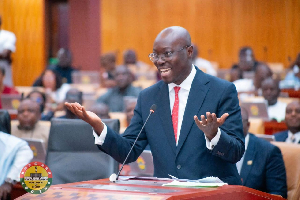By Joe Kingsley Eyiah, OCT, Brookview Middle School, Toronto
"Government has stepped up measures and all things being equal, the numerous schools currently operating under trees will be eliminated by 2012, to make all school children comfortable to learn,"-John Dramani Mahama, Accra-Ghana; Sept. 28, 2010
The Vice President of the Republic of Ghana, Hon. John Dramani Mahama was recently on record as having repeated his government's commitment to eliminate all schools under trees throughout the country by 2012. He pointed out that the provision of numerous schools would facilitate the elimination of the current shift system, which encouraged truancy and delinquency among pupils. (GNA)
At the face value of this announcement from the government of Ghana one would be pleased with the “good news” considering the importance of education in national development. For any country to make any meaningful progress, it must invest heavily in education. However, it is lamentable to bring to the fore that a nation like Ghana, after 53 years of independence, still has about 4,000 basic schools organized under trees, 5,000 in dilapidated structures, and 7,500 without sanitary facilities. To many a politician in Ghana this illustrates the enormity of the challenge that confronts education financing in that country, but to the ordinary Ghanaian this demonstrates how politicians have been paying lip service to the improvement of education over the years in the country. It is in this light that we are closely monitoring the efforts of President Professor Attah Mills and his government in solving the problems that confront education in Ghana. We have not forgotten the promise by the President to make education a top priority in his ‘Better Ghana’ agenda. 2012 is not far, Professor!
The claims and demands on any government by the education sector are always overwhelming. But with proper planning and good management such demands are efficiently and adequately met in the interest of national development and NOT on the altar of political party agendas. Is Ghana prioritizing her responses to the country’s education problems well?
Priorities:
The goodwill of governments (past and present) in Ghana towards development of education has always been undeniable. This notwithstanding, one sees an awful failure on the part of governments to commit resources to the most essential areas of the education sector. A good example of this ‘unnecessary politicking’ in the development of education at the basic level is the government’s preference to supply school children with free uniforms to providing the children with decent shelters under which they can learn despite weather conditions. How do ‘well clothed’ school children learn under trees when it is raining heavily? I am not implying here that it is wrong to assist poor parents in clothing their children properly for school. However, I would rather that the child would be provided with acceptable and humane place to learn than to be addressed up and denied a conducive environment where s/he could conveniently learn.
GETFund & Otumfou Educational Fund:
The Ghana Education Trust Fund (GETFund), set up ten years ago to provide supplementary financing for primary, secondary and tertiary education in Ghana, according to reports, is battling with a debt of GHC166.34 million (GNA, Feb., 2010). The debt, as alleged, is the result of excess payments arising out of poor quality of spending, lack of project due diligence and the absence of monitoring and evaluation of projects and programs under GETFund financing. The good intentions with which the GETFund was established have been left to the dogs! And the Education Trust Fund is becoming a big failure as schools continue to be organized under trees in the country. If schools under trees are to be eliminated by 2012 as promised by the Vice President of Ghana then all resources towards running of education in the country, including GETFund and the Otumfou Education Fund must be properly managed to maximize financing of education in the country.
Churches Must Give Back (Help) to the Rural Areas:
It is no secret in Ghana that in the past many churches had started in schools. Most of such churches now have big congregations worshipping in their own buildings and enjoying economic prosperity. Such and all churches in the country must support the government efforts in providing decent classrooms for schools, especially in the rural areas where they are needed most.
Ghanaians in Diaspora- Youth Initiative at U of T:
Ghanaians in Diaspora must also assist mother Ghana to provide classrooms for all schools in the country. The many Ghanaian cultural associations and branches of political parties outside the country must be seen mobilizing resources wherever they are towards the development of schools in rural Ghana.
I would like to commend a group of Ghanaian/African students in Canada for their untiring efforts to raise funds to help build or support needy schools in the Western Region of Ghana. With their headquarters based at the University of Toronto, this youth-led non-profit organization known as African Students’ Advancement Project (ASAP) held fundraising activities in Toronto early in the summer to mobilize funds towards their plans of assisting schools in Africa in general and Ghana in particular. Their representatives were in Ghana last August to do the grounds work. To these youth and many others in other countries embarking on similar projects for mother Ghana, I say, AYEKOO!
Opinions of Tuesday, 5 October 2010
Columnist: Eyiah, Joe Kingsley














